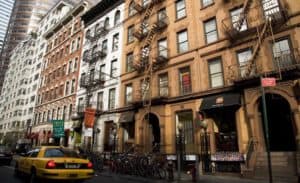New York City to launch special office to protect tenants from ‘worst landlords’

“The city’s worst landlords will have a new sheriff to fear: the Mayor’s Office to Protect Tenants,” de Blasio said. “A new arm of city government that will root out the worst landlord abuse. A force that will hold every city agency as well accountable for protecting tenants.” The mayor also paused his annual address to sign an executive order creating the office.
The new team will have a five-person staff and a $450,000 budget; the de Blasio administration is actively searching for a director to helm the agency, according to City Hall spokesperson Jane Meyer.
The Mayor’s Office to Protect Tenants will ensure that a myriad of city agencies—including the Department of Buildings, Housing Preservation and Development, and Social Services—“all work in unison,” according to Meyer. It’s expected to get to work within the year.
In addition to spearheading the city’s anti-harassment and outreach initiatives, it will also serve as a “central resource” for tenants, landlords, and others, according to the executive order.
“Most landlords do the right thing—most play by the rules—but too many others try to game the system and push working people out of their apartments so they can hike the rent,” said de Blasio during the address. “We’re not going to take that.”
Inspectors and law enforcement agents will be sent to buildings when landlords fail to correct city violations in order to push out residents. Property owners will be slapped with fines and penalties, but the office will go as far as seizing buildings from habitual bad landlords and dole them out to nonprofit groups.
“We’ll use every tool we have,” de Blasio said during his speech. “We’ll fine the landlord, we’ll penalize the landlord, but if the fines and penalties don’t cut it, we will seize their buildings and we will put them in the hands of a community non-profit that will treat tenants with the respect they deserve.”
The mayor also plans to annually seize upwards of 40 of the city’s most distressed buildings and transition the properties to “responsible, mission-driven ownership,” according to City Hall. In a process that involves City Council approval, landlords who fail to correct property violations and pay fines owed to the city within a reasonable timeframe will have their buildings claimed.
Certain fines against landlords will also be quintupled, such as the false certification of repairs that currently comes with an up to $250 fee for non-lead violations and a maximum of $3,000 for lead-related violations. The mayor’s office will also seek to push for legislation on the state level that would automatically convert judgments into tax liens after one year, forcing landlords to make repairs to avoid losing their buildings to tax lien sales.
The office aims to serve as a crucial tool to conduct tenant outreach by tracking outreach efforts across multiple city agencies on the neighborhood level and by working with city agencies to develop data tools and strategies to better target buildings and their owners.
In 2017, de Blasio created the Office of the Tenant Advocate, but the agency tasked with overseeing the office—the Department of Buildings—never requested funds to staff the office. Duties intended for the Office of the Tenant Advocate then fell to the Buildings Marshal, city officials have said.
Tenant advocacy groups were quick to commend the new office, including the Association for Neighborhood and Housing Development, an organization of 100 affordable housing and economic development advocacy groups serving low- and moderate-income New Yorkers.
“Taking a comprehensive approach to protecting tenants is an important step forward,” the group said in a statement. “This is an especially urgent issue since the problem of tenant harassment has grown into a crisis as landlords increasingly use harassing tactics to push-out low-rent paying tenants. This crisis threatens the stability of families and neighborhoods across the city, and is undermining much of our current affordable housing.”
The plan also earned a surprising endorsement from the Real Estate Board of New York.
“REBNY supports Mayor de Blasio’s call to increase targeted enforcement on unlawful landlords,” REBNY president John Banks said in a statement, noting that a fraction of landlords are responsible for the majority of the city’s tenant harassment abuses.
“Enhanced coordination among city agencies will better protect tenants and prevent additional bureaucracy that negatively impacts the vast majority of property owners who comply with the law,” he continued.
Source: ny.curbed.com















 Accessibility
Accessibility